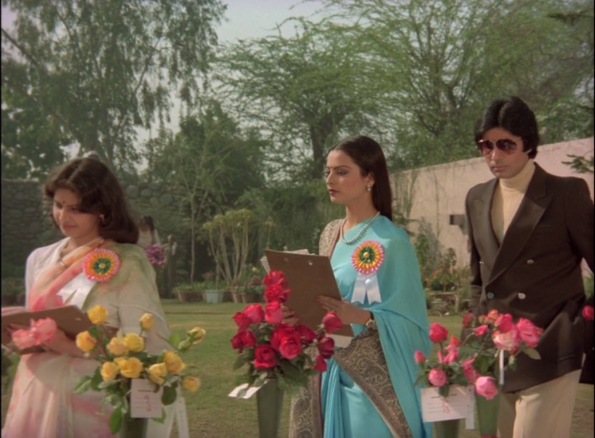Silsila – The hidden meaning of roses
Lire cet article en français : Silsila – Le sens caché des roses
Silsila, directed by Yash Chopra is a masterpiece of Indian cinema. Be it the music, the songs lyrics, the dialogues, the landscapes or even the color of sarees, everything has been purposefully and skillfully orchestrated.
The movie, released in 1981, depicts a chain of events (this is what the Arabic word « silsila » means) where passion and the sacred institution of mariage come to clash. Shekhar and Amit Malhotra are two orphan brothers very close to each other. When Shekhar dies in a plane crash, his fiancee Shobha is expecting. Amit, moved by her despair, decides to marry her and to renounce to his love for Chandni. Some time later, Shobha loses her child in a car accident and when destiny place Amit in front of Chandni, now the spouse of Dr. Anand, it becomes impossible for him to continue to suppress his passion for her. The two lovers renew their relation, while their spouses watch powerless.
In an exquisite scene, Amit tries to convince the newly married Chandni to meet him. She is at a flower exhibition with friends to judge the different roses. Every questions, every requests by Amit, standing behind her, are punctuated by the names of the different roses enumerated by Chandni’s friend. This scene, if one does not pay attention or if one ignores the signification of the roses’ names, is quite banal. But, when each rose’s name is seen in the light of Amit’s requests (or vice versa), one realizes that they depict surreptitiously the different stages a lover goes through: love, wait, and bliss.
A few months ago, Yash Raj gave me the task to adapt in French the subtitles of the film. The experience was of course wonderful. I was provided with the English subtitles and this how I noticed that in this scene, the English translator had left in Hindi the names of two roses (there are six in total, four of which are in English in the original), depriving the viewer from whole dimension of the scene.

Below, the whole dialogue in Hindi:
Chandni: Asha, third entry का क्या नाम बताया ?
Asha: « My Love ».
Amit: मुझे तुमसे कुछ बात करनी है।
Asha: चौथी है, « हम दोनों »।
Amit: कहाँ मिल सकती हो ?
Asha: Fith entry, « शाम-ए-इंतज़ार। »
Amit: Please, Chandni.
Asha: Sixth, « Love Story ».
Amit: कल उसी वक़्त उसी जगह।
Chandni: मैं नहीं आ सकती।
Asha: Seventh, « Daredevil ».
Amit: मैं तुम्हारा इंतज़ार करूँगा।
Asha: Eighth, « Eternal Bliss ».
« My love » is already Amit calling out to Chandni. « Hum donon » (« We two ») is what Amit wants to talk about. « Sham-E-Intezar » (literally « Evening’s waiting ») is the consequence of Chandni’s silence. « Love Story » is what Amit and Chandni are sharing. « Daredevil » is Amit’s attitude, who doesn’t give up in spite of Chandni’s refusal. And finally, « Eternal Bliss » is what Amit feels after the silent consent of Chandni.

One Comment
Laissez un commentaireTrackbacks